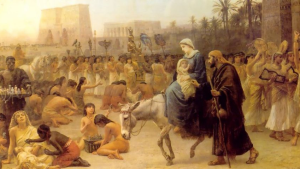It’s that time of year again. The yearly December pro-life celebration that has everyone rooting for an unborn child, then exploding in celebration when he is born.
Everyone gets involved: Our city streets are redecorated to celebrate the birth to come. Music in stores celebrates an impoverished mother and adoptive father who committed to carrying the child to term. And everywhere you look, corporations entice you with new ways to celebrate a refugee couple giving birth far from home.
Christmas is the biggest pro-life celebration in the world.
Advent reminds us why this joy ignited thousands of years of Christmas celebrations.
Advent is the season of darkness. It takes place in the literal darkest days of the year, and it is filled with the words of prophets who are deeply unsettled about the state of the world, at a time when the whole world anticipated a great event.
“Oh, that you would rend the heavens and come down!” Isaiah cries. He sees “a root from the stump of Jesse” and predicts “a child will be born to us.”
In Advent, a dark world longs for a savior, and the great Jewish prophet sees what God will do: He will send a baby.
Into this darkness, God sent an angel to Mary in Nazareth.
The angel who visits Mary gives her remarkable news: She will be pregnant with a child who will receive an eternal kingdom. The story has many layers of meaning, but one thing it spells out is that unborn children and infants are critically important.
As if to emphasize that point, the angel tells Mary that her relative, Elizabeth, is also pregnant, in her sixth month. Mary goes “in haste” to her house in the “hill country of Judea,” a trip that, even if you hurried, would have taken at least a week or two. After that, Mary stayed at Elizabeth’s, presumably, for at least three months.
We now know what this would mean in Jesus’ development. Around day 20, Jesus’ heart began to beat — the Sacred Heart’s first activity. A month later, all of his bodily systems would be present, including little fingers and toes.
But on the day Mary first arrived — when Jesus was just 10 to 20 days old — none of that had happened. What was Jesus like then? At the earliest stage, a human embryo is already a boy or girl with DNA setting life expectancy and other traits.
Jesus the embryo was already Jesus, but he didn’t look at all like Jesus yet.
And so it was that, before the Sacred Heart had begun to beat, before the hands of Christ that would break bread had formed, before the feet that would walk on water had toes, Mary arrived at Elizabeth’s house.
And Luke’s Gospel tells us that “She entered the house of Zechariah and greeted Elizabeth. And when Elizabeth heard the greeting of Mary, the baby leaped in her womb.”
Mary brought the unborn Jesus to Elizabeth’s house, and as soon as she arrived, an unborn child reacted to the sound of her voice. A baby more than six months in utero witnessed to Jesus Christ, who was just a few days in utero.
This astounding witness to the unborn Jesus was greatly amplified after Jesus was born.
Before his birth, an unborn prophet witnessed to him with a jump. After birth, a multitude of angels proclaimed: “To you is born this day in the city of David a Savior, who is Christ the Lord.”
Men came from the Far East with gifts and asked, “Where is he who has been born king of the Jews? For we have seen his star in the East, and have come to worship him.”
The birth of Jesus is so important, it remains part of Christian spirituality to this day. Jesus tells Nicodemus, and us, “Truly, truly, I say to you, unless one is born anew, he cannot see the kingdom of God.”
St. Paul explains that this birth by baptism makes us adopted sons of God, like Christ, “all who are led by the Spirit of God are sons of God. … When we cry, ‘Abba! Father!’ it is the Spirit himself bearing witness with our spirit that we are children of God.”
So, this Advent and Christmas, pray for the unborn.
A great and powerful king was once in the same position as them, and he came to save us all.


